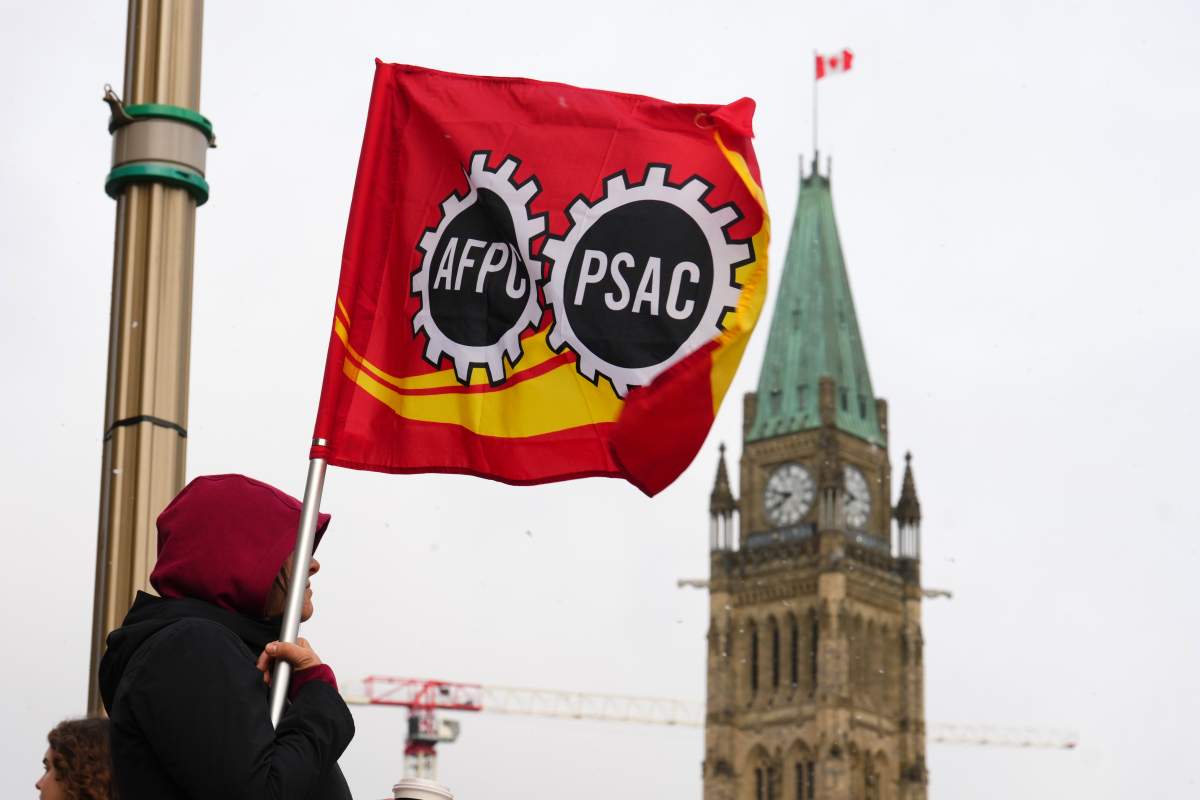The Public Service Alliance of Canada (PSAC) must be “prepared to compromise” to reach a deal with the federal government because it can’t “write a blank cheque” to them, Treasury Board President Mona Fortier says.

More than 155,000 PSAC members, including 35,000 workers in the union’s tax unit, went on strike Wednesday after failing to reach a deal on a new agreement with the government.
PSAC set a deadline of 9 p.m. eastern Tuesday to strike a deal, but union leaders said their issues at the bargaining table “have still not been addressed.” However, those talks are ongoing, both sides say.

Fortier told reporters on Parliament Hill – where PSAC members were outside the West Block striking – it was “disappointing” to see workers strike due to the “progress” both sides have made at the negotiating table in recent days.
“We recognize and respect employees’ rights to strike, but when a good offer is on the table and there is a genuine commitment to compromise, the focus should be on negotiation,” she said.
“We will continue to work with the PSAC to reach agreements that are fair and competitive, but we cannot do that unless the union is prepared to compromise. We cannot write a blank cheque.”

Union strike comes as tax deadline nears
The strike, which the union says is one of the largest in Canadian history, will impact many government services. Canadians can expect delays when dealing with government departments, most notably with taxes as the May 1 tax filing deadline approaches.
The Canada Revenue Agency (CRA) has warned of delays in processing income tax returns; Employment and Social Development Canada and Service Canada say delays to passport services and grants and contributions programs will be expected.

Get daily National news
Government officials said in a presentation to reporters that roughly 48,000 striking workers have been declared essential, and will be working during the disruptions. Of those, 1,400 work with the CRA.
More than 300 Service Canada Centres will remain open during the labour disruption, they said. Days of operation and hours of in-person service may vary for a limited number of locations depending on the nature of the labour disruption, they added.
Service will be limited to clients requiring assistance with Old Age Security, Canada Pension Plan, Employment Insurance and issuance of social insurance numbers. Passport delivery will be limited to Canadians experiencing humanitarian or emergency situations, the officials said.
“Canadians have every right and expectation to see the services that they expect delivered. We understand it’s really important to respect labour rights, and there’s a labour disruption right now. It’s the first day,” Prime Minister Justin Trudeau told reporters Wednesday morning.
“Let’s make sure that while this is going on, we are at the negotiating table — that’s where we expect both managers and unions to sit down and keep the hard work for Canadians.”
The delays stem from nearly two years of negotiations. Talks for a new contract originally began in June 2021, with the union declaring an impasse in May 2022 and both parties filing labour complaints since then.
The union called a strike vote in January, and it announced that members had voted in favour of a strike mandate early last week. Members of its tax division returned a strike mandate the week before.

Wage increases have been top of mind at the bargaining table.
The Treasury Board released a statement Tuesday night, saying it offered a nine per cent wage increase over three years, as well as proposals on telework, shift premiums, improved leave with pay for family-related responsibilities and measures to support employment equity and diversity and inclusion.
But the union has pushed for a 13.5 per cent retroactive increase in wages over three years, with the union saying the rate of inflation was 13.8 per cent over the same period.
- High blood pressure drug recalled over low blood pressure pill mix-up
- Canadian Tire ordered to pay nearly $1.3 million for false advertising
- ‘Doesn’t make sense’: Union files labour complaint over federal 4-day in-office mandate
- Ottawa gives Canada Post a $1.01-billion loan amid ongoing financial struggles
PSAC’s desired increase works out to 4.5 per cent over each of those three years. It has also kept issues such as greater limits on contract work, more anti-racism training and provisions for remote work on the table.
“Over the past two weeks, we’ve been able to resolve a number of issues through mediation, and most importantly, we have put a fair, competitive wage offer on the table,” Fortier said.
“We have also put forward proposals on a number of other priorities for the PSAC, including remote work, increased shift and weekend premiums and improved leave with pay for family-related responsibilities. We have no doubt that there is enough common ground to compromise and reach an agreement with the PSAC, and I am convinced by working together we can do so.”
Meanwhile, the CRA said in a statement on Wednesday it offered the union’s tax division wage increases of nine per cent over three years. The agency said the union countered with a proposal of 22.5 per cent over three years, which includes a market adjustment of two per cent.
Workers will be required to show up at picket lines for four hours each day while on strike, the union says. They will have to scan a barcode at those picketing locations in order to receive daily strike pay of $75. Those who do not join the picket lines will not get paid during the strike.
There will be exceptions to the rules for those who have mobility issues, have disabilities or have discussed their circumstances with the union. They will be given other administrative duties to complete in lieu of picketing.
— with files from Sean Boynton










Comments